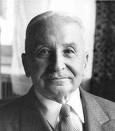Ludwig von Mises was snubbed by economists world-wide as he warned of a credit crisis in the 1920s. We ignore the great Austrian at our peril today.
 Mises’s ideas on business cycles were spelled out in his 1912 tome “Theorie des Geldes und der Umlaufsmittel” (“The Theory of Money and Credit”). Not surprisingly few people noticed, as it was published only in German and wasn’t exactly a beach read at that.
Mises’s ideas on business cycles were spelled out in his 1912 tome “Theorie des Geldes und der Umlaufsmittel” (“The Theory of Money and Credit”). Not surprisingly few people noticed, as it was published only in German and wasn’t exactly a beach read at that.
Taking his cue from David Hume and David Ricardo, Mises explained how the banking system was endowed with the singular ability to expand credit and with it the money supply, and how this was magnified by government intervention. Left alone, interest rates would adjust such that only the amount of credit would be used as is voluntarily supplied and demanded. But when credit is force-fed beyond that (call it a credit gavage), grotesque things start to happen.
Ordinarily, any random spikes in credit would be quickly absorbed by the system—the pricing errors corrected, the half-baked investments liquidated, like a supple tree yielding to the wind and then returning. But when the government holds rates artificially low in order to feed ever higher capital investment in otherwise unsound, unsustainable businesses, it creates the conditions for a crash. Everyone looks smart for a while, but eventually the whole monstrosity collapses under its own weight through a credit contraction or, worse, a banking collapse.
The system is dramatically susceptible to errors, both on the policy side and on the entrepreneurial side. Government expansion of credit takes a system otherwise capable of adjustment and resilience and transforms it into one with tremendous cyclical volatility.
“Theorie des Geldes” did not become the playbook for policy makers. The 1920s were marked by the brave new era of the Federal Reserve system promoting inflationary credit expansion and with it permanent prosperity. The nerve of this Doubting-Thomas, perma-bear, crazy Kraut! Sadly, poor Ludwig was very nearly alone in warning of the collapse to come from this credit expansion. In mid-1929, he stubbornly turned down a lucrative job offer from the Viennese bank Kreditanstalt, much to the annoyance of his fiancée, proclaiming “A great crash is coming, and I don’t want my name in any way connected with it.”
We all know what happened next. Pretty much right out of Mises’s script, overleveraged banks (including Kreditanstalt) collapsed, businesses collapsed, employment collapsed. The brittle tree snapped. Following Mises’s logic, was this a failure of capitalism, or a failure of hubris?
Mises’s solution follows logically from his warnings. You can’t fix what’s broken by breaking it yet again. Stop the credit gavage. Stop inflating. Don’t encourage consumption, but rather encourage saving and the repayment of debt. Let all the lame businesses fail—no bailouts.
Mises started getting some much-deserved respect once “Theorie des Geldes” was finally published in English in 1934. It is unfortunate that it required such a disaster for people to take heed of what was the one predictive, scholarly explanation of what was happening.
But then, just Mises’s bad luck, along came John Maynard Keynes’s tome “The General Theory of Employment, Interest and Money” in 1936. Keynes was dapper, fresh and sophisticated. He even wrote in English! And the guy had chutzpah, fearlessly fighting the battle against unemployment by running the currency printing press and draining the government’s coffers.
He was the anti-Mises. So what if Keynes had lost his shirt in the stock-market crash. His book was peppered with fancy math (even Greek letters) and that meant rigor, modernity. To add insult to injury, Mises wasn’t even refuted by Keynes and his ilk. He was ignored.
Fast forward 70-some years, during which we saw Keynesianism’s repeated disappointments, the end of the gold standard, persistent inflation with intermittent inflationary recessions and banking crises, culminating in Alan Greenspan’s “Great Moderation” and a subsequent catastrophic collapse in housing and banking. Where do we find ourselves? At a point of profound insight gained through economic logic, trial and error, and objective empiricism? Or right back where we started?
With interest rates at zero, monetary engines humming as never before, and a self-proclaimed Keynesian government, we are back again embracing the brave new era of government-sponsored prosperity and debt. And, more than ever, the system is piling uncertainties on top of uncertainties, turning an otherwise resilient economy into a brittle one.
How curious it is that the guy who wrote the script depicting our never ending story of government-induced credit expansion, inflation and collapse has remained so persistently forgotten. Must we sit through yet another performance of this tragic tale?
via Mark Spitznagel: The Man Who Predicted the Depression – WSJ.com. Mr. Spitznagel is the founder and chief investment officer of the hedge fund Universa Investments LP, based in Santa Monica, Calif.
